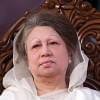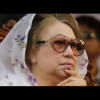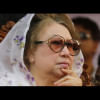‘ACC totally fails to prove graft allegations against Khaleda’
BNP Chairperson Khaleda Zia’s counsel Jamir Uddin Sircar today said the Anti-Corruption Commission has totally failed to prove the allegations brought against Khaleda in Zia Orphanage Trust corruption case.
Sircar, also former Speaker of parliament, said this while placing his arguments in the graft case.
He also pleaded the Special court-5 at Bakshibazar saying, "Khaleda seeks justice, deliver her a true justice."
Judge Md Akhtaruzzaman adjourned argument hearing for today and ordered to place rest of the argument on January 16, 17 and 18.
Sircar, also a BNP Standing Committee member, reminded the court about democracy, rule of law and justice saying, "The false cases were filed against Khaleda during 1/11 only for political reason and to obstruct her political life."
On July 3, 2008, the Anti-Corruption Commission filed the Zia Orphanage Trust graft case with Ramna Police Station accusing Khaleda Zia, her eldest son Tarique Rahman, and four others for misappropriating over Tk 21 million (2.10 crore) that came as grants from a foreign bank for orphans.
On August 8, 2011, the commission filed the Zia Charitable Trust graft case with Tejgaon Police Station accusing four people, including Khaleda Zia, for abusing power in raising funds for the trust from unknown sources.
Sircar in his arguments also said, "Analysing all arguments and evidence produced by the prosecution, I have come to the conclusion that the Anti-Corruption Commission hasn’t been able to prove any charges against her.”
"So, the accused will definitely benefit if (the prosecution) fails to prove beyond any reasonable doubt the charges brought in a criminal case."
Sircar read out certain portions of BNP hairperson Khaleda Zia's self-defence statements in the court and repeatedly emphasised the importance of rule of law, democracy and justice in society.
He drew the attention of the court as to whether the statements made by Prime Minister Sheikh Hasina and other Awami League leaders would be considered as interference into the functioning of the court.

 For all latest news, follow The Daily Star's Google News channel.
For all latest news, follow The Daily Star's Google News channel. 








Comments